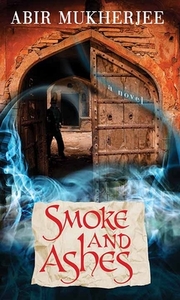Take a photo of a barcode or cover
mysterious
tense
medium-paced
Plot or Character Driven:
Character
Strong character development:
No
Loveable characters:
Complicated
Diverse cast of characters:
Complicated
Flaws of characters a main focus:
Yes
4.5*
Wow! Mukherjee keeps upping his game and this third title is excellent!
We rejoin Captain Wyndham at a moment when his opium addiction has become something he can’t just push to the side anymore. Barely keeping the threads of his life together, he is furthermore thrusted into a murder investigation that has a special connection to him, having seen a body with the same mutilations in an opium den. This is of course a fact he can’t share since it might cost him his job. Questions naturally abound. Are these ritualistic killings, or something much darker? And if that wasn’t enough, Major Dawson and Section H are putting their oars in!
As with the previous instalments, Sam’s voice is fascinating and compelling, but also known. We’ve followed our flawed hero now for two books and are involved in what happens to him and to Sergeant 'Surrender-not’ Banerjee. This case feels a lot more personal too, perhaps due to the situation Sam finds himself in. Similarly, this aspect is mirrored by the events rocking Calcutta politically and socially, ground to a standstill by the many non-violent protests, rendering the city a veritable powder keg waiting to explode...
The author succeeds in combining flawlessly the murder mystery with the historical events, evoking the India of 1921 in all its splendour and horror. Somehow you can feel and taste it all! I for one am totally invested in these characters and the world they inhabit, and cannot wait for the next book!
Wow! Mukherjee keeps upping his game and this third title is excellent!
We rejoin Captain Wyndham at a moment when his opium addiction has become something he can’t just push to the side anymore. Barely keeping the threads of his life together, he is furthermore thrusted into a murder investigation that has a special connection to him, having seen a body with the same mutilations in an opium den. This is of course a fact he can’t share since it might cost him his job. Questions naturally abound. Are these ritualistic killings, or something much darker? And if that wasn’t enough, Major Dawson and Section H are putting their oars in!
As with the previous instalments, Sam’s voice is fascinating and compelling, but also known. We’ve followed our flawed hero now for two books and are involved in what happens to him and to Sergeant 'Surrender-not’ Banerjee. This case feels a lot more personal too, perhaps due to the situation Sam finds himself in. Similarly, this aspect is mirrored by the events rocking Calcutta politically and socially, ground to a standstill by the many non-violent protests, rendering the city a veritable powder keg waiting to explode...
The author succeeds in combining flawlessly the murder mystery with the historical events, evoking the India of 1921 in all its splendour and horror. Somehow you can feel and taste it all! I for one am totally invested in these characters and the world they inhabit, and cannot wait for the next book!
It’s 1921 in Calcutta and Captain Sam Wyndham and his sergeant ‘Surrender-not’ Banerjee get caught up in a murder investigation the secret police are also interested in. Sam is struggling to keep his opium addiction secret, and peace in the city which chafes under British rule. I really enjoy this series; a vivid sense of place, endearing characters, and intriguing, thought-provoking mysteries.
A solid detective novel set in India in the early 1920’s. Sam Wyndham and his faithful companion “Surrender-not” take on a series of seemingly unrelated murders until they become related. And they run afoul of the intelligence police.
Always a good read!
Always a good read!
This book was very much judged and read because I liked the cover. I don’t think there is a time period in history where I don’t enjoy a good murder especially when I am going to learn something about that period in time. It’s 1921 in this story an Englishman in India at a time of massive unrest, Sam Wyndham is a likable character with a monkey on his back in the shape of an opium addiction one that is getting harder and harder to conceal as he finds a murdered man within an opium den. A murder that will ask too many questions if he reveals it.
Sam and his partner Surrender-Not are extremely likable and I was very much looking forward to the second book only to find out that this was in fact the 3rd in the series. Colour me surprised as it is almost unheard of to find out you are in the middle of a series without the author giving you a clue that there is two books before this one. I’m not complaining too much, one of my pet peeves is when an author spends a quarter of the book re-telling the previous one so this was a total surprise and makes it an excellent standalone if you don’t want to get stuck in a series.
The thing that did kind of annoyed me was, this author is very fond of a simile, they are every where which is the reason for the markdown.
Sam and his partner Surrender-Not are extremely likable and I was very much looking forward to the second book only to find out that this was in fact the 3rd in the series. Colour me surprised as it is almost unheard of to find out you are in the middle of a series without the author giving you a clue that there is two books before this one. I’m not complaining too much, one of my pet peeves is when an author spends a quarter of the book re-telling the previous one so this was a total surprise and makes it an excellent standalone if you don’t want to get stuck in a series.
The thing that did kind of annoyed me was, this author is very fond of a simile, they are every where which is the reason for the markdown.
Thoroughly enjoyed this book! I love the historical basis as well as the the main characters. Highly recommend this series.
I prefer Banerjee. I don't dislike Sam, but I wish Banerjee also had a narrative voice.
This book was my favorite of the three that Mukherjee has written so far. He is truly an extremely engaging writer. Sam Wyndham, the flawed yet very likable detective, has the perfect blend of charm, intelligence, wit, empathy and humor. His relationship with the young Surrender-not is endearing. Mukherjee captures the mood of Calcutta and much of Bengal, very authentically in this mystery novel. With the introduction of real life heroes of India's freedom movement like Deshbondhu C.R Das, Basanti Das and Netaji Subhash Bose, the turmoil of that age becomes very real for those readers who may not be very familiar with the history of India's freedom movement.
mysterious
tense
medium-paced
adventurous
tense
fast-paced
Plot or Character Driven:
A mix
Strong character development:
Yes
Loveable characters:
Yes
Diverse cast of characters:
Yes
Flaws of characters a main focus:
Complicated


